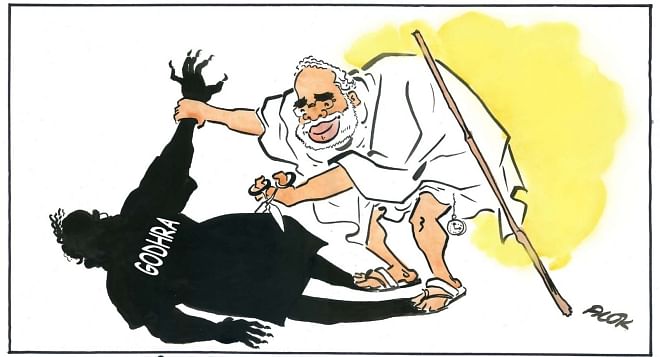The menace that's Modi
The menace that's Modi

As India's nine-phase election tilts in favour of the Bharatiya Janata Party's opponents, new apologists have risen to defend Narendra Modi. Some of them see virtue and talent, even poetic genius, in a man who presided over the anti-Muslim butchery in Gujarat-2002.
Yet others are shamelessly writing barely-disguised job applications to him. They include former diplomats and policemen in the extreme-Right Vivekananda International Foundation, and Arvind Panagaria, an undistinguished US-based neoliberal economist.
Panagaria is lobbying to become the government's chief economic adviser. His always-slender claim to this stands undermined by his “theory” that Indians are genetically different from other humans, and predisposed to being shorter. Hence, international standards of measuring malnutrition by height-for-age and weight-for-age ratios don't apply to Indians!
This is Panagaria's answer to the widespread, valid, criticism that despite recently accelerated growth, India suffers from worse child malnutrition than most poorer, Sub-Saharan African countries.
Panagaria's bogus thesis is a deadly combination: voodoo economics, misplaced nationalism and genetic racism -- and apologia for lopsided growth. It has been powerfully refuted by economists and nutritionists.
Malnutrition makes almost half of India's children vulnerable to infections and recurring illnesses which reduce their ability to learn and grow. Instead of being ashamed of this wasted human potential, and taking corrective steps, India should “grow” and prolong its children's misery!
Some other Modi apologists whitewash his role in Gujarat-2002 citing the Special Investigation Team's flawed interrogation, exposed by journalist Manoj Mitta in his recent Fiction of Fact-Finding.
Modi's tall claims about Gujarat's “development” have been dismantled in Atul Sood's Poverty Amidst Prosperity.
Other Modi apologists offer even more weird arguments. India must choose between secularism and GDP growth, necessary for a “demographic dividend.” Modi is best-placed to stimulate growth. So Indians should embrace communalism and secure the dividend!
Yet other apologists say Modi has turned “moderate.” But his campaign is thoroughly communal. This is India's most communalised and dirtiest election, with Modi stridently promising to throw out all (Muslim) Bangladeshi migrants, condemning the “pink revolution” (export of buffalo meat), and demonisation of Azamgarh as a “terrorist base.”
Modi says God and “Ma Ganga” have “chosen” him to lead India. He uses such religious-communal motifs, as did by illegally displaying the Ram and temple images at the Faizabad campaign-rally.
Modi's campaign has a strong upper-caste bias too, witness Ramdev's remarks about Rahul Gandhi visiting Dalit homes for “a honeymoon,” and senior BJP leaders' call to end reservations for the underprivileged.
The BJP is also running a confrontationist campaign against the Election Commission. This isn't “moderation,” but hardened Hindutva.
Modi apologists say that as prime minister, he will have to work within India's democratic institutions; these are strong and cannot be subverted.
This flies in the face of Modi's record in corrupting and suborning the Gujarat police, bureaucracy and judiciary. Without doing this, he couldn't have become complicit in the 2002 pogrom, staged fake “encounter” killings, and subverted justice.
Most Indian institutions are fragile, including political parties and the media. “Paid news” and corporate ownership/control of the media are undermining its credibility. Most parties don't hold internal elections.
Recent scams show corrosion not just of institutions under the executive, like the police, civil service and intelligence agencies, but also institutions charged with oversight of the executive, including Parliament and the courts, and to an extent, the Election Commission, which is unable/unwilling to enforce its own rules on campaign spending and communal propaganda.
India's justice delivery system has repeatedly failed -- in punishing the culprits of the 1984 anti-Sikh violence, the 2000 Pathribal killings, in preventing harassment of innocents falsely charged with terrorist attacks or abuse of the Armed Forces Special Powers Act.
Most institutions aren't accountable to Parliament. The BJP didn't even allow Parliament to function for five years -- and got away. It's the greatest beneficiary of institutional erosion, which generates impunity for it. It will accelerate such erosion.
Should a BJP-led government come to power, it will shift the goalposts in education, culture, gender relations, internal and external security, approach to the Maoist movement, affirmative action, and inter-community relations. It will coarsen the quality of India's public discourse.
It would be a surprise if it didn't impose a Hindutva-based curriculum in education, suppress creative academic research, suborn various academies and learned institutions under the culture ministry, censor books, films, plays and art exhibitions, and encourage vandalism against whatever it considers offensive to Hindutva.
A BJP-led regime is likely to discontinue or dilute many pro-poor social programmes and follow a brazenly pro-corporate policy which further widens social, economic and regional inequalities while privatisatising public enterprises and services.
India's religious minorities will be intimidated, socially disenfranchised, and reduced to second-class citizens, as in Gujarat. Human rights abuses will become rampant. A “strong-state” obsession and militarisation of society will prevail.
India under Modi will be a far worse and more uncompassionate society than under Vajpayee, reflecting Modi's “56-inch-chest” authoritarianism and Islamophobia. None of this bodes well for India or South Asia.
The writer is an eminent Indian columnist.